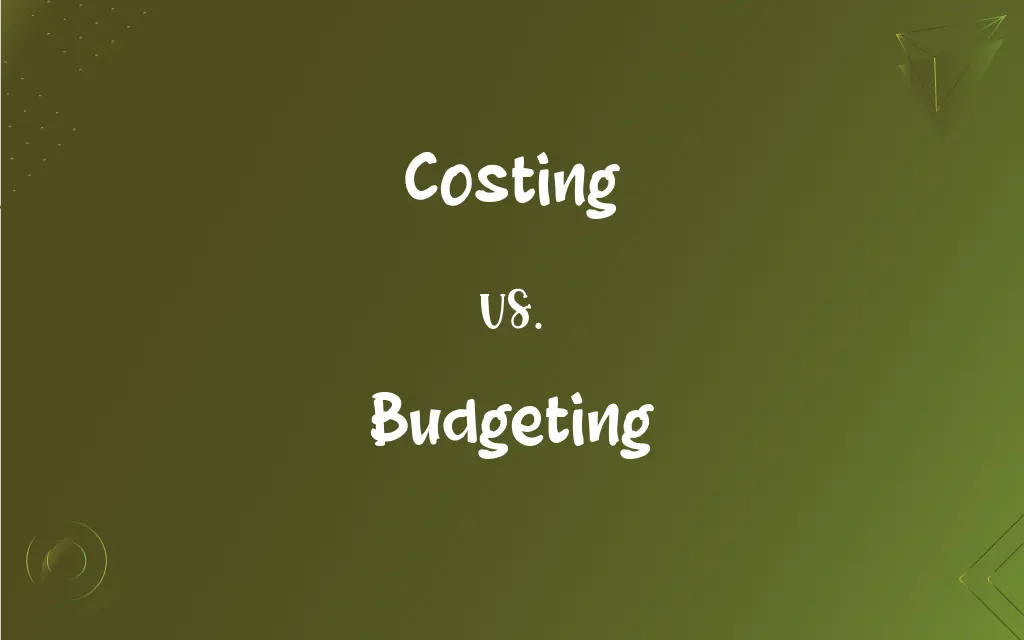Costing vs. Budgeting: What's the Difference?
Edited by Aimie Carlson || By Harlon Moss || Published on January 24, 2024
Costing is the process of determining the expenses associated with a product or project. Budgeting involves planning and allocating financial resources for future activities.

Key Differences
Costing involves calculating the total expenses required to produce a product or service, including materials, labor, and overheads. Budgeting, on the other hand, is the process of creating a financial plan for future spending, savings, and investments.
Costing is focused on the expenses incurred in the production or execution phase, while budgeting entails a broader scope, encompassing planning for all financial aspects of a business or personal finances over a specific period.
Costing provides detailed information about the cost components of a product, essential for pricing and profitability analysis. Budgeting, conversely, sets financial targets and limits, ensuring effective resource allocation and financial management.
In costing, accuracy in estimating the cost of each component is crucial for effective pricing strategies. In budgeting, the emphasis is on forecasting future income and expenses to maintain financial health.
Costing is a key element in decision-making for production and operations. Budgeting guides financial decisions and strategic planning, shaping the direction of business or personal finance strategies.
ADVERTISEMENT
Comparison Chart
Focus
Determining production expenses
Planning financial resource allocation
Scope
Specific to product/service costs
Encompasses overall financial planning
Purpose
Essential for pricing and profitability
Sets financial goals and spending limits
Importance
Accurate estimation of costs
Forecasting future income and expenses
Role
Supports operational decisions
Guides strategic financial planning
ADVERTISEMENT
Costing and Budgeting Definitions
Costing
Determining the monetary value of resources used in production.
Costing helps set the right price for our products.
Budgeting
Strategy for managing cash flow within a business or household.
Effective budgeting prevented unnecessary expenses.
Costing
Estimating the expenses associated with a project or service.
Accurate costing is essential for the construction project's success.
Budgeting
Allocating financial resources for various activities over a period.
Budgeting helped the company plan its investments wisely.
Costing
Calculation of the total cost involved in manufacturing a product.
The company's costing process revealed higher raw material expenses.
Budgeting
Process of creating a plan for spending and saving money.
Personal budgeting is key to achieving financial goals.
Costing
Analysis of direct and indirect costs of a business activity.
Through costing, the company identified areas to reduce expenses.
Budgeting
Estimating future income and expenses for financial management.
Annual budgeting sets the financial direction for the year.
Costing
Process of establishing the financial requirements for a task.
Event costing provided a clear picture of the budget needed.
Budgeting
Preparing a financial plan to control and monitor spending.
The project's success depended on strict budgeting.
Costing
An amount paid or required in payment for a purchase; a price.
Budgeting
An itemized summary of estimated or intended expenditures for a given period along with proposals for financing them
Submitted the annual budget to Congress.
Costing
The expenditure of something, such as time or labor, necessary for the attainment of a goal
"Freedom to advocate unpopular causes does not require that such advocacy be without cost" (Milton Friedman).
FAQs
Why is budgeting important?
For planning and managing financial resources effectively.
What is the primary goal of costing?
To determine the total expenses of production.
Is budgeting only for businesses?
No, it's also essential for personal finance management.
Can costing affect pricing decisions?
Yes, it's crucial for setting product prices.
Does budgeting restrict spending?
It sets guidelines to control and optimize spending.
Can costing lead to cost reduction?
Yes, by identifying and minimizing unnecessary expenses.
How does costing impact profitability?
Accurate costing helps in maximizing profitability.
Can budgeting help in debt management?
Yes, it’s a key tool for managing and reducing debt.
How does costing affect supply chain management?
It influences decisions on sourcing and logistics.
Does budgeting involve savings plans?
Yes, it includes planning for savings and investments.
What factors are considered in costing?
Material, labor, and overhead costs.
How often should budgeting be done?
Typically annually, but it can vary based on needs.
Can budgeting impact investment decisions?
Yes, it helps in allocating funds for investments.
Is costing important for small businesses?
Yes, for effective pricing and cost control.
Does costing vary between industries?
Yes, based on industry-specific cost factors.
What’s the difference between fixed and variable costing?
Fixed costs remain constant; variable costs fluctuate with production.
How detailed should costing be?
As detailed as possible for accuracy.
Is budgeting flexible?
It should be adaptable to changing financial situations.
How does budgeting assist in risk management?
It prepares financially for potential risks and uncertainties.
What role does budgeting play in strategic planning?
It provides a financial framework for strategic decisions.
About Author
Written by
Harlon MossHarlon is a seasoned quality moderator and accomplished content writer for Difference Wiki. An alumnus of the prestigious University of California, he earned his degree in Computer Science. Leveraging his academic background, Harlon brings a meticulous and informed perspective to his work, ensuring content accuracy and excellence.
Edited by
Aimie CarlsonAimie Carlson, holding a master's degree in English literature, is a fervent English language enthusiast. She lends her writing talents to Difference Wiki, a prominent website that specializes in comparisons, offering readers insightful analyses that both captivate and inform.






































































